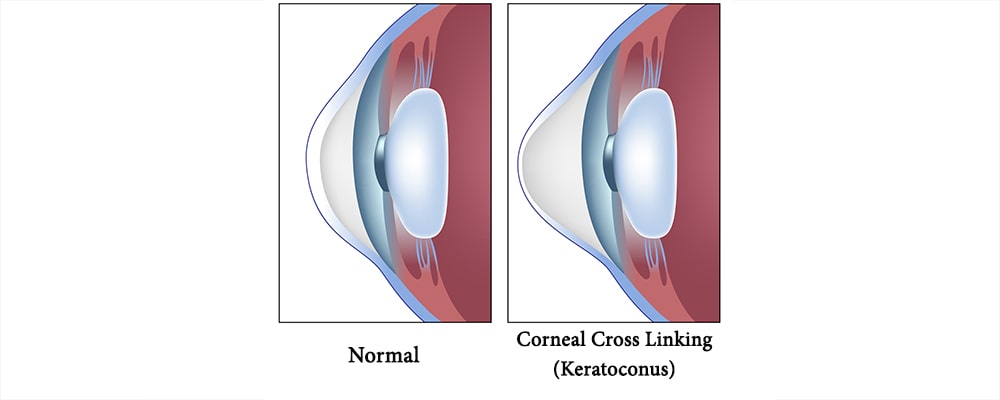
What is CCL surgery?
In the situation that somebody has a corneal disease like keratoconus, his cornea can get weakened. Corneal cross linking (CCL) surgery is the operation to solve this problem. LASIK surgery can seldom cause weakness in cornea, as a complication, too. You may also see some other names for the corneal cross linking surgery such as CCL, CXL, corneal collagen cross linking, KXL and C3-R.
Surgery procedure
During the cornea cross linking surgery (CXL) the surgeon uses a liquid riboflavin (a vitamin of the B complex) on the eye surface and then apply an ultraviolet light (UVA) to remove the ectasia (swelling of cornea which leads to worsening your sight) of the cornea.
In a normal cornea there are several crosslinks that locate between the cornea’s collagen fibers to keep its shape strongly. Our cornea would create new collagen crosslinks to improve the damaged ones caused by diabetes mellitus, aging or smoking.
Types of CCL
There are two types of corneal cross linking as we mentioned below:
- Epithelium-on CXL: In this type of CCL surgery, the epithelium (the outer layer of cornea) would not get damaged, so more amount of riboflavin should flow inside the eye.
- Epithelium-off CXL: This case includes the removal of the cornea’s epithelium so that the riboflavin can move inside the cornea.
Specialists also say that some other operations can be added to CXL too, such as corneal inserts or implants which can aid the cornea to save its shape.
Are you a good candidate for corneal cross linking surgery?
Eye doctors believe that the corneal cross linking (CCL) has the best efficiency if your eye disease is in a level that your cornea’s shape isn’t changed too much. It is efficient for you if there is a considerable vision loss caused by keratoconus or another corneal diseases. Another tip that you should notice is that if you do the cross linking earlier it can help to improve your cornea’s shape, give you a better visual sharpness.
It is also said that the CXL can be helpful to remove some corneal infections. Another usage of corneal cross linking surgery is to treat the corneal wounds which cannot be treated by topical antibiotics.
Some researches show that the CCL (corneal cross linking) method is the best answer for the patients who have visual fluctuation problems. It is also said that some of the people who need LASIK surgery can have a cross linking surgery before their LASIK, so that their cornea would be stronger before going under the excimer laser (in LASIK) which reshape the cornea.
Complications and risks
- Cloudy vision may occur
- In some cases the loss of stromal nerves happens
- You may have some scars on your cornea
- Infection
- Eyelid swelling
- Immoderate tearing
- After the surgery you may experience inflation of cornea but most of the time it lasts for a short time
- Dry eyes
- Glare
- Blurred vision
- Your cornea’s endothelium may get hurt
- The patient may lose his corneal sensation
- Your vision may get hazy
You must notice that most of the mentioned complications rarely happen.
- a considerable vision loss caused by corneal diseases
- some corneal infections
- corneal wounds which cannot be treated by topical antibiotics
- visual fluctuation problems


Reviews
Number of pending reviews15250